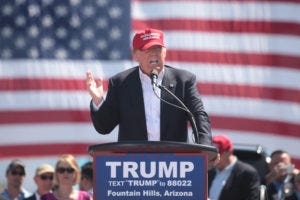Emoluments Clause Violations as a Conspiracy to Defraud the United States
If President Trump violates the Constitution’s Emoluments Clause, what might be the remedy? One possibility is a suit challenging such violations as a conspiracy to defraud the United States. Since Donald Trump was elected, a great deal of attention has been focused on the Foreign Emoluments Clause. This previously obscure provision forbids federal officials from accepting any gifts or emoluments – payments for services rendered -- from a foreign state. President Trump maintains an ownership interest in his far-flung business operations and has resisted calls to divest. As a result, many believe he has been violating the Clause from the moment he was sworn in. (For a more detailed discussion of the Emoluments Clause and what it prohibits, see my earlier post here.) Just last week there were reports of a new Emoluments Clause issue. The Trump Organization apparently had been in a decade-long legal battle to secure a trademark for the Trump name in China. One month after Trump’s inauguration, China finally granted the trademark – even though doing so may have been a violation of its own regulations. This decision came a few days after Trump publicly reaffirmed the U.S. commitment to a “One China” policy. He had expressed some skepticism about that policy shortly after he was elected. The timing of these events raises obvious concerns about the President’s possible divided loyalties and about foreign governments gaining leverage over him. Given Trump’s extensive international holdings, similar potential issues abound.
The Difficult Question of Standing to Sue
If indeed Trump is violating the Emoluments Clause, who can bring a lawsuit to remedy that violation? Plaintiffs in a lawsuit must have standing, a concrete injury that can be addressed by the court. Finding someone with legal standing is a serious obstacle to enforcing the Emoluments Clause. Some argue that only political remedies (including impeachment) are possible. These commentators believe a court likely would find that any private lawsuit based on the Clause presents a non-justiciable political question. A public watchdog group called Citizens for Responsibility and Ethics in Washington (CREW) filed a lawsuit shortly after the inauguration, claiming that Trump is violating the Clause. CREW asserts it has standing because Trump’s actions have forced it to devote time and resources to fighting him on these issues. As a result, CREW maintains, it cannot do much of the other work it would otherwise be doing. CREW has some very prominent attorneys working on the case, but many are skeptical of this standing theory. Others have suggested a competing business might have standing. For example, if the Bank of China sent all its business to the new Trump hotel in Washington, D.C., a competitor hotel might claim it was injured. But it's not clear a court would uphold such a private right of action. The Clause's purpose is to ensure government integrity, not to protect private competitors. And even if standing were found, such a lawsuit likely would face significant hurdles in proving causation and damages.

Quo Warranto: A Possible Solution to the Standing Issue
Last week a new legal theory concerning how to enforce the Clause began making the rounds (see articles here and here). Prof. Jed Shugerman at Fordham University Law School first proposed the idea. It avoids the problem of establishing standing to sue President Trump directly. Instead, it focuses on pursuing the Trump Organization for its participation in the President’s receipt of foreign emoluments. Shugerman notes that states may use a procedure know as quo warranto to bring a civil action against a corporation engaged in illegal behavior. Corporations are creatures of state law, and the state has the power to discipline those that act illegally. For example, New York Business Corporation Law § 1101 allows the state attorney general to bring an action for dissolution against any corporation that has “transacted its business in a persistently fraudulent or illegal manner.” Shugerman argues a state could use this procedure to charge a Trump corporation with serving as a conduit for improper emoluments. The New York Attorney General would be an ideal candidate to bring such a case, Shugerman says, because the Trump Organization is organized under the laws of New York. If the suit were successful, a court could revoke the Trump Organization’s corporate charter. Shugerman and some others have already filed a letter with the New York Attorney General asking him to consider such a lawsuit. Shugerman believes a number of other jurisdictions could bring similar claims against Trump organizations within their state. The beauty of Shugerman’s theory is that it avoids the problem of finding private individuals with standing to sue the official violating the Emoluments Clause. Instead it involves public officials – the state attorneys general – filing suit against a private company. There’s no question that the attorneys general have standing to bring such a proceeding. But I think potential legal issues remain.
What Constitutes Illegal Behavior for a Quo Warranto Proceeding?
Prof. Shugerman’s theory faces at least one potential roadblock: proving the Trump Organization or related corporations are conducting business in a “fraudulent or illegal manner” within the meaning of the law. For example, Shugerman suggests a suit could be brought against Trump’s new hotel in D.C. for violating its lease with the General Services Administration. But violation of a lease typically would be considered just a breach of contract, not fraudulent or illegal. It would be surprising if every lease dispute potentially subjected a corporation to an action for dissolution. Similarly, private corporations typically can’t violate the Constitution, which applies to government actors. So it’s probably unlikely the New York legislature had constitutional violations in mind when it wrote the statute prohibiting illegal corporate behavior. A quo warranto suit based on a constitutional violation would face a strong argument that the statute does not apply. Even if constitutional violations could serve as the illegal conduct for a quo warranto proceeding, it’s not clear the Trump Organization would violate the Emoluments Clause by receiving gifts from a foreign state. The Emoluments Clause bars only actions by federal officials. On its face the Clause does not prohibit anything done by the Trump Organization or any private company. The corporation is a separate legal entity, even if it does bear Trump’s name. Prof. Shugerman suggests a state attorney general could hold the Trump Organization liable as the President's corporate “conduit.” I’m not so sure. In general it’s true that corporations can be held responsible for actions of their agents under the doctrine of respondeat superior (“let the master answer”). This holds true for criminal violations as well as civil. But it’s not clear the same principle should apply when it comes to violations of a constitutional obligation imposed only on a government official. In addition, under respondeat superior the actions of the agent must be within the scope of his authority. Trump reportedly has turned control of his organization over to his sons. If that’s the case, then he arguably no longer has authority to act on behalf of the corporation. And if that’s true, the corporation could not be held vicariously liable for any of his conduct. When it comes to accepting emoluments the actions are more likely to be taken by Trump’s sons or other corporate officials – but the Emoluments Clause does not apply to them. In short, I’m not confident that trying to hold the Trump Organization vicariously liable for Trump’s own constitutional violations will work. But all this got me thinking about whether there might be other legal theories under which a state attorney general could argue that Trump-owned companies act unlawfully when they receive emoluments. And that led me to a core white collar criminal statute: conspiracy to defraud the United States.

The Emoluments Clause and Conspiracy to Defraud the United States
The federal conspiracy statute, 18 U.S.C. § 371, prohibits two types of conspiracies: conspiracy to commit an offense against the United States and conspiracy “to defraud the United States, or any agency thereof in any manner or for any purpose.” A conspiracy requires that two or more people knowingly enter into an agreement to achieve an unlawful purpose and that at least one of them takes some action in furtherance of that agreement. Conspiracy to commit an offense against the U.S. usually means conspiracy to commit a federal crime – conspiracy to commit securities fraud or conspiracy to obstruct justice, for example. But the second prong of the statute, conspiracy to defraud the U.S. "in any manner or for any purpose," has a broader reach. To defraud someone usually means to deprive him of money or property. But conspiracy to defraud the United States under section 371 also includes any conspiracy to impair, obstruct or impede the lawful functions of the U.S. government. In Hammerschmidt v. United States in 1924, the Supreme Court held that conspiracy to defraud the U.S. includes schemes “to interfere with or obstruct one of its lawful government functions by deceit, craft, or trickery, or at least by means that are dishonest.” The statute applies to schemes such as disguising transactions to evade some government regulatory program, or hiding assets to thwart the IRS. Individuals can commit the offense even if their underlying conduct, standing alone, would not be illegal. The scheme need not result in any financial harm to the government. Another important aspect of conspiracy law is that not all co-conspirators need to be capable of committing the underlying offense that is the object of a conspiracy. For example, just last spring the Supreme Court held in Ocasio v. United States that private citizens could be convicted of conspiracy to commit extortion under color of official right. Because they were not public officials, they could not be convicted of the extortion offense themselves. But the Court held they were still capable of agreeing to help a public official commit extortion, and thus could be found guilty of conspiracy. So with the Emoluments Clause the argument would go like this: the Clause is part of a constitutional structure set up to ensure that officers of the United States are free from outside influences and conflicts of interest. The members of the Trump Organization and foreign government agents who provide benefits to that Organization (and thus indirectly to Trump himself) are impairing, obstructing, and impeding that government function by facilitating the acceptance of improper emoluments by the President. This constitutes a conspiracy to defraud the United States under section 371. Although corporate officers and foreign agents could not violate the Emoluments Clause themselves, they may conspire to help President Trump violate it. And although their actions may not violate any other law, that doesn't matter. Those actions may still constitute a conspiracy to defraud the United States by interfering with its proper operations. This would be analogous to cases involving bribery. Laws against bribery are similar to the Emoluments Clause in that both seek to prevent government officials from being swayed by improper outside influences. Prosecutors have charged schemes to bribe federal officials as conspiracies to defraud the United States. Bribery corrupts the political system and thereby impairs the lawful government functions of the United States. The same is true of violations of the Emoluments Clause.

Details of a Potential Conspiracy
There are a number of possible co-conspirators in any such case. If we take the China trademark example, co-conspirators could potentially include Chinese officials involved. They could also include any officials within the Trump Organization who took part in the transaction. The Trump Organization itself would be vicariously liable through the acts of those officials. A state attorney general would even have the option of listing the President himself as a co-conspirator. By refusing to divest and by allowing his businesses to accept foreign emoluments, he arguably has joined the agreement. A conspiracy to defraud must involve some kind of deception or dishonesty. There are a number of possibilities here. Assuming the discussions that led up to something like the China trademark deal are not publicly disclosed, for example, that concealment furthers the scheme to defraud. Other deceptions are likely involved in other potential Emoluments Clause violations. One could even argue that the President’s failure to disclose his tax returns is a part of the deception. By concealing the full scope of his financial holdings and potential conflicts, it helps the conspiracy to succeed. Of course, it’s not realistic to expect Donald Trump's own Department of Justice to file a criminal case charging members of the Trump Organization with conspiracy. But that's not necessary. Building on Prof. Shugerman’s argument, a more promising option is to use conspiracy as a basis to allege fraudulent or illegal corporate behavior in a quo warranto proceeding. This theory avoids many of the potential quo warranto hurdles discussed above. The unlawful conduct is not the violation of the Emoluments Clause but engaging in a conspiracy to defraud the United States by impeding its legitimate operations. There’s no question that a private corporation is capable of committing that offense. The New York statute quoted above requires that the corporation have engaged in fraudulent or illegal conduct. Participating in a conspiracy to defraud the U.S. fits the bill perfectly. In a civil proceeding, of course, the plaintiff only needs to prove the conspiracy by a preponderance of the evidence, a much lower bar than the proof beyond a reasonable doubt required in a criminal prosecution. And civil discovery in such a proceeding could lead to disclosure of a great deal of relevant information, including Trump’s tax returns. Like so much involving the Emoluments Clause, this theory is novel and untested. But given the purpose of the Clause, the breadth of the conspiracy statute’s ban on conspiracies to defraud the U.S. “in any manner or for any purpose,” and the use of a similar theory in bribery cases, I think it’s a compelling argument. A state attorney general or other litigant contemplating a quo warranto proceeding should consider throwing this conspiracy argument into the mix. Click here to join the Sidebars mailing list and receive e-mail notification of future posts.

